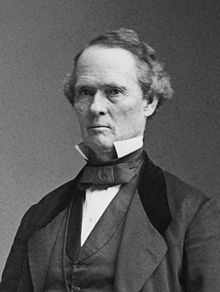- 1 2 3 4 5 6 7 8 9 10 11 12 13 14 15 16 17 18 19 20 21 22 23 Portrait and Biographical Record of Western Oregon: Containing Biographical Sketches of Many Well Known Citizens of the Past and Present. Chicago: Chapman Publishing Co., 1904; pp. 620–621.
- 1 2 3 4 5 6 7 Bancroft, Hubert Howe (1886). History of Oregon, 1834-1848. Vol. 1. San Francisco, CA: The History Company. pp. 776–777, fn. 38.
- ↑ Corning, Howard M. Dictionary of Oregon History. Portland, OR: Binfords and Mort, 1956. p. 142.
- 1 2 Helmer, Normandy S. "Historic Photograph Collections: Joseph Lane photographs, 1850s-1903: Biographical Sketch". University of Oregon Libraries, Eugene, OR, 2005.
- 1 2 "Oregon Encyclopedia: Joseph Lane". Oregon Encyclopedia. Oregon Historical Society. Retrieved April 16, 2021.
- ↑ Means, Howard. The Avenger Takes His Place: Andrew Johnson and the 45 Days That Changed the Nation. Harcourt, 2006, pp. 69–71.
- ↑ "Peter Waldo". Talky Tina Press. Retrieved September 10, 2015.
- 1 2 3 Lansing, Ronald B. Nimrod: Courts, Claims, and Killing on the Oregon Frontier. Pullman, WA: Washington State University Press, 2005, p. 266.
- ↑ "Obituary of Joseph Lane". Oregon Newspaper Research. Retrieved September 13, 2015.
- 1 2 "Floed-Lane House". The Umpqua Trapper. Douglas County Historical Society. 1985. Retrieved March 8, 2014.
- ↑ "Oregon National Register List" (PDF). Oregon Parks and Recreation Department. June 6, 2011. p. 11. Archived from the original (PDF) on June 9, 2011. Retrieved March 8, 2014.
- ↑ Gannett, Henry (1905). The Origin of Certain Place Names in the United States. Government Printing Office. pp. 180.
Works cited
- Speech of Hon. Joseph Lane, of Oregon, on the Suppression of Indian Hostilities in Oregon: Delivered in the House of Representatives, April 2, 1856. Washington, DC: Congressional Globe Office, 1856.
Further reading
- Hendrickson, James E. Joe Lane of Oregon: Machine Politics and the Sectional Crisis, 1849-1861. New Haven, CT: Yale University Press, 1967.
- Si Sheppard. “‘Union for the Sake of the Union’: The Selection of Joseph Lane as Acting President of the United States, 1861.” Oregon Historical Quarterly 115, no. 4 (2014): 502–29. online.
External links
- United States Congress. "Joseph Lane (id: L000062)". Biographical Directory of the United States Congress .
- Joseph Lane at Find a Grave
- General Joseph Lane at First Hand History, includes primary documents.
- Guide to the Joseph Lane Papers at the University of Oregon The Joseph Lane papers include diaries, correspondence, legal documents, newspaper clippings, and a draft of Nina Lane Faubion's biography of Lane
- Joseph Lane's photographs at the University of Oregon.
Joseph Lane | |
|---|---|
 | |
| United States Senator from Oregon | |
| In office February 14, 1859 –March 3, 1861 |

